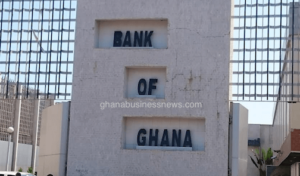Economic crisis impacts Ghana banks’ profits
 The banking sector in Ghana has seen its profits decline as a result of the current economic crisis facing the country, according to the Bank of Ghana.
The banking sector in Ghana has seen its profits decline as a result of the current economic crisis facing the country, according to the Bank of Ghana.
Ghana is highly indebted and all major credit rating agencies have downgraded the country to junk, because the country is unable to service its debts, subsequently forcing the country to seek redemption from the International Monetary Fund (IMF).
The central bank states that driven by the mark-to-market losses on investments, higher impairments on loans, and rising operating costs profitability levels in the banking sector declined.
It said profit-after-tax was GH¢3.9 billion at the end of December 2022, representing 18.9 per cent contraction year-on-year, compared to 12.3 per cent annual growth recorded in 2021.
It noted further that developments in the banking sector were broadly reflective of current macroeconomic conditions, with rising cost of credit due to inflationary pressures, and revaluation-driven balance sheet performance. As a result, the performance of the sector moderated in December 2022 compared with December 2021, with some key Financial Soundness Indicators (FSIs) recording significant declines, the Bank said in its Monetary Policy Committee report issued in January.
However, banks’ net interest income grew by 23.0 per cent to GH¢15.8 billion, higher than the growth of 14.5 per cent in 2021. Net fees and commissions went up by 27.4 per cent to GH¢3.7 billion, from the growth of 24.8 per cent recorded in 2021, it said.
“Accordingly, operating income increased by 30.9 per cent, compared with 14.6 per cent recorded a year earlier. The strong outturn in operating income was however moderated by increased operating expenses and provisioning during the year. Operating expenses rose by 32.2 per cent in December 2022, compared with 14.2 per cent growth in 2021,” it added.
Provisions also increased sharply by 184.0 per cent in December 2022 relative to a contraction of 4.7 per cent a year earlier, due to the strong uptick in credit growth, elevated credit risks, and impairments on investments. As a result, profit before tax declined by 13.5 per cent to GH¢6.4 billion in December 2022, compared with an annual growth of 22.1 per cent a year earlier. New loans and advances in 2022 increased to GH¢53.7 billion, reflecting an annual growth of 47.5 per cent, compared with the growth of 6.8 per cent in 2021, the Bank reported.
The central bank notes that Trends in Financial Soundness Indicators were mixed, reflecting heightened risks faced by the banking industry.
“The industry’s Capital Adequacy Ratio (CAR) declined to 16.6 per cent, but remained above the prudential minimum of 13 per cent, as at December 2022, from 19.6 per cent in December 2021, attributed to losses on mark-to-market investments, increase in risk-weighted assets of banks from the high growth in actual credit, and the price effect of the depreciation of the Ghana cedi on foreign currency denominated loans.
The sector’s profitability indicators, namely, the return-on-equity and the return-on-assets also declined during the period, in line with declining profit after tax and profit-before-tax, respectively. The non-performing loans (NPL) ratio however improved to 14.8 percent in December 2022 compared with 15.2 percent in December 2021, on account of high credit growth, relative to the increased stock of NPLs between the two periods,” it said.
Meanwhile, the Bank states that the total assets of banks increased to GH¢221.0 billion, representing an annual growth of 22.9 per cent in December 2022, compared to a growth of 20.4 per cent a year earlier, while, total deposits ended the year at GH¢157.9 billion, representing an increase of 30.4 per cent in 2022, relative to a growth of 16.6 per cent in 2021.
Credit continued to also increase, recording a growth of 30.2 per cent to GH¢70.0 billion from GH¢53.8 billion in December 2021. Total investments, on the other hand, contracted by 4.8 per cent to GH¢79.2 billion in December 2022, relative to a 29.0 per cent annual growth in 2021, as banks rebalanced asset portfolios in response to the Domestic Debt Exchange Programme, it said.
By Emmanuel K Dogbevi
Copyright ©2023 by NewsBridge Africa
All rights reserved. This article or any portion thereof may not be reproduced or used in any manner whatsoever without the express written permission of the publisher except for the use of brief quotations in reviews.
